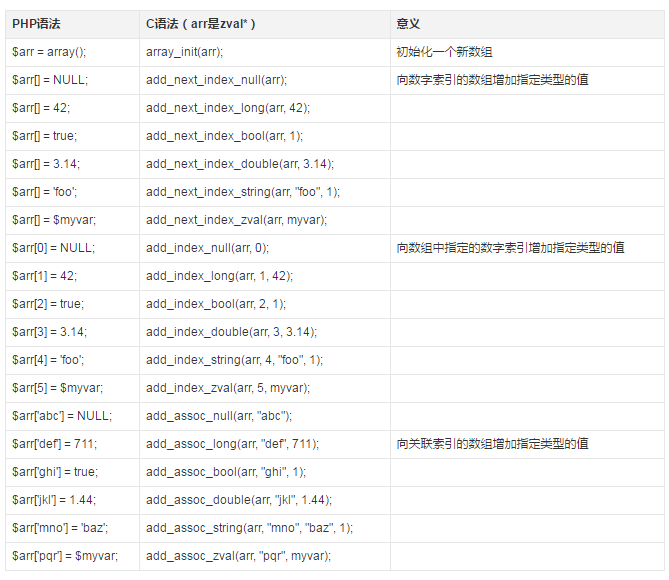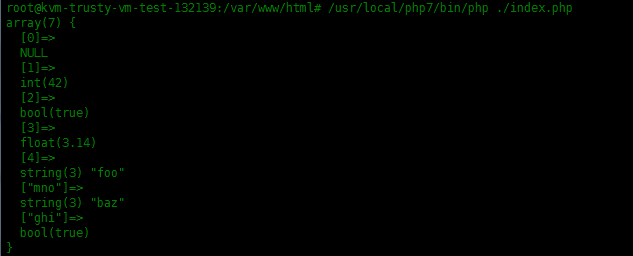
Getting Started
Now you can declare simple functions and return static or dynamic values. Define INI options and declare internal or global values. This chapter will introduce how to receive the value of the parameter passed in from the calling script (php file), and how the PHP kernel and Zend engine operate internal variables.
Receive parameters
Different from user control code, the parameters of internal functions are not actually declared in the function header. Function declarations are in the form of: PHP_FUNCTION(func_name), and parameter declarations are not included. Parameters are passed in through the address of the parameter list, and are passed into every function, regardless of whether there are parameters.
Let’s take a look by defining the function hello_str(), which will receive a parameter and output it together with the greeting text.
PHP_FUNCTION(hello_greetme)
{ char *name = NULL;
size_t name_len;
zend_string *strg; if (zend_parse_parameters(ZEND_NUM_ARGS() TSRMLS_CC, "s", &name, &name_len) == FAILURE) {
RETURN_NULL();
}
strg = strpprintf(0, "你好: %s", name);
RETURN_STR(strg);
}Most zend_parse_parameters() blocks look similar. ZEND_NUM_ARGS() tells the Zend engine the information about the parameters to be taken. TSRMLS_CC is used to ensure thread safety. The return value detects whether it is SUCCESS or FAILURE. Normally the return is SUCCESS. Unless too few or too many parameters are passed in or the parameters cannot be converted to the appropriate type, Zend will automatically output an error message and return control to the calling script.
Specifying "s" indicates that this function expects only one parameter to be passed in, and the parameter is converted to the string data type, and the address is passed into the char * variable.
In addition, there is an int variable passed to zend_parse_parameters() by address. This enables the Zend engine to provide the byte length of the string so that binary-safe functions no longer rely on strlen(name) to determine the length of the string. Because actually using strlen(name) doesn't even get the correct result because name may contain NULL characters before the end of the string.
In php7, another way to obtain parameters, FAST_ZPP, is provided to improve the performance of parameter parsing.
#ifdef FAST_ZPPZEND_PARSE_PARAMETERS_START(1, 2)
Z_PARAM_STR(type) Z_PARAM_OPTIONAL Z_PARAM_ZVAL_EX(value, 0, 1)
ZEND_PARSE_PARAMETERS_END();#endifParameter type table

The last four types are all zvals *. This is because in the actual use of PHP, the zval data type stores all user space variables. Three "complex" data types: resources, arrays, and objects. When their data type codes are used in zend_parse_parameters(), the Zend engine performs type checking, but because there is no corresponding data type for them in C, no type conversion is performed.
Zval
Generally speaking, zval and php user space variables are very troublesome and the concepts are difficult to understand. By PHP7, its structure is defined in Zend/zend_types.h:
struct _zval_struct {
zend_value value; /* value */
union {
struct {
ZEND_ENDIAN_LOHI_4(
zend_uchar type, /* active type */
zend_uchar type_flags,
zend_uchar const_flags,
zend_uchar reserved) /* call info for EX(This) */
} v;
uint32_t type_info;
} u1;
union {
uint32_t next; /* hash collision chain */
uint32_t cache_slot; /* literal cache slot */
uint32_t lineno; /* line number (for ast nodes) */
uint32_t num_args; /* arguments number for EX(This) */
uint32_t fe_pos; /* foreach position */
uint32_t fe_iter_idx; /* foreach iterator index */
uint32_t access_flags; /* class constant access flags */
uint32_t property_guard; /* single property guard */
} u2;
};You can see that variables are stored through the _zval_struct structure, and the value of the variable is of zend_value type:
typedef union _zend_value {
zend_long lval; /* long value */
double dval; /* double value */
zend_refcounted *counted;
zend_string *str;
zend_array *arr;
zend_object *obj;
zend_resource *res;
zend_reference *ref;
zend_ast_ref *ast;
zval *zv;
void *ptr;
zend_class_entry *ce;
zend_function *func;
struct {
uint32_t w1;
uint32_t w2;
} ww;
} zend_value;Although the structure looks like It's very big, but if you look closely, it's actually a union, an expansion of value. u1 is type_info, and u2 is various other auxiliary fields.
zval type
变量存储的数据是有数据类型的,php7中总体有以下类型,Zend/zend_types.h中有定义:
/* regular data types */ #define IS_UNDEF 0 #define IS_NULL 1 #define IS_FALSE 2 #define IS_TRUE 3 #define IS_LONG 4 #define IS_DOUBLE 5 #define IS_STRING 6 #define IS_ARRAY 7 #define IS_OBJECT 8 #define IS_RESOURCE 9 #define IS_REFERENCE 10 /* constant expressions */ #define IS_CONSTANT 11 #define IS_CONSTANT_AST 12 /* fake types */ #define _IS_BOOL 13 #define IS_CALLABLE 14 #define IS_ITERABLE 19 #define IS_VOID 18 /* internal types */ #define IS_INDIRECT 15 #define IS_PTR 17 #define _IS_ERROR 20
测试
书写一个类似gettype()来取得变量的类型的hello_typeof():
PHP_FUNCTION(hello_typeof)
{
zval *userval = NULL;
if (zend_parse_parameters(ZEND_NUM_ARGS() TSRMLS_CC, "z", &userval) == FAILURE) {
RETURN_NULL();
}
switch (Z_TYPE_P(userval)) {
case IS_NULL:
RETVAL_STRING("NULL");
break;
case IS_TRUE:
RETVAL_STRING("true");
break;
case IS_FALSE:
RETVAL_STRING("false");
break;
case IS_LONG:
RETVAL_STRING("integer");
break;
case IS_DOUBLE:
RETVAL_STRING("double");
break;
case IS_STRING:
RETVAL_STRING("string");
break;
case IS_ARRAY:
RETVAL_STRING("array");
break;
case IS_OBJECT:
RETVAL_STRING("object");
break;
case IS_RESOURCE:
RETVAL_STRING("resource");
break;
default:
RETVAL_STRING("unknown type");
}
}这里使用RETVAL_STRING()与之前的RETURN_STRING()差别并不大,它们都是宏。只不过RETURN_STRING中包含了RETVAL_STRING的宏代替,详细在 Zend/zend_API.h 中有定义:
#define RETVAL_STRING(s) ZVAL_STRING(return_value, s)
#define RETVAL_STRINGL(s, l) ZVAL_STRINGL(return_value, s, l)
#define RETURN_STRING(s) { RETVAL_STRING(s); return; }
#define RETURN_STRINGL(s, l) { RETVAL_STRINGL(s, l); return; }创建zval
前面用到的zval是由Zend引擎分配空间,也通过同样的途径释放。然而有时候需要创建自己的zval,可以参考如下代码:
{
zval temp;
ZVAL_LONG(&temp, 1234);
}数组
数组作为运载其他变量的变量。内部实现上使用了众所周知的 HashTable .要创建将被返回PPHP的数组,最简单的方法:

做一个测试:
PHP_FUNCTION(hello_get_arr)
{
array_init(return_value);
add_next_index_null(return_value);
add_next_index_long(return_value, 42);
add_next_index_bool(return_value, 1);
add_next_index_double(return_value, 3.14);
add_next_index_string(return_value, "foo");
add_assoc_string(return_value, "mno", "baz");
add_assoc_bool(return_value, "ghi", 1);
}
add_*_string()函数参数从四个改为了三个。
数组遍历
假设我们需要一个取代以下功能的拓展:
<?php
function hello_array_strings($arr) {
if (!is_array($arr)) {
return NULL;
}
printf("The array passed contains %d elements\n", count($arr));
foreach ($arr as $data) {
if (is_string($data))
echo $data.'\n';
}
}php7的遍历数组和php5差很多,7提供了一些专门的宏来遍历元素(或keys)。宏的第一个参数是HashTable,其他的变量被分配到每一步迭代:
ZEND_HASH_FOREACH_VAL(ht, val)
ZEND_HASH_FOREACH_KEY(ht, h, key)
ZEND_HASH_FOREACH_PTR(ht, ptr)
ZEND_HASH_FOREACH_NUM_KEY(ht, h)
ZEND_HASH_FOREACH_STR_KEY(ht, key)
ZEND_HASH_FOREACH_STR_KEY_VAL(ht, key, val)
ZEND_HASH_FOREACH_KEY_VAL(ht, h, key, val)
因此它的对应函数实现如下:
PHP_FUNCTION(hello_array_strings)
{
ulong num_key;
zend_string *key;
zval *val, *arr;
HashTable *arr_hash;
int array_count;
if (zend_parse_parameters(ZEND_NUM_ARGS() TSRMLS_CC, "a", &arr) == FAILURE) {
RETURN_NULL();
}
arr_hash = Z_ARRVAL_P(arr);
array_count = zend_hash_num_elements(arr_hash);
php_printf("The array passed contains %d elements\n", array_count);
ZEND_HASH_FOREACH_KEY_VAL(arr_hash, num_key, key, val) {
//if (key) { //HASH_KEY_IS_STRING
//}
PHPWRITE(Z_STRVAL_P(val), Z_STRLEN_P(val));
php_printf("\n");
}ZEND_HASH_FOREACH_END();
}因为这是新的遍历方法,而我看的还是php5的处理方式,调试出上面的代码花了不少功夫,总的来说,用宏的方式遍历大大减少了编码体积。哈希表是php中很重要的一个内容,有时间再好好研究一下。




